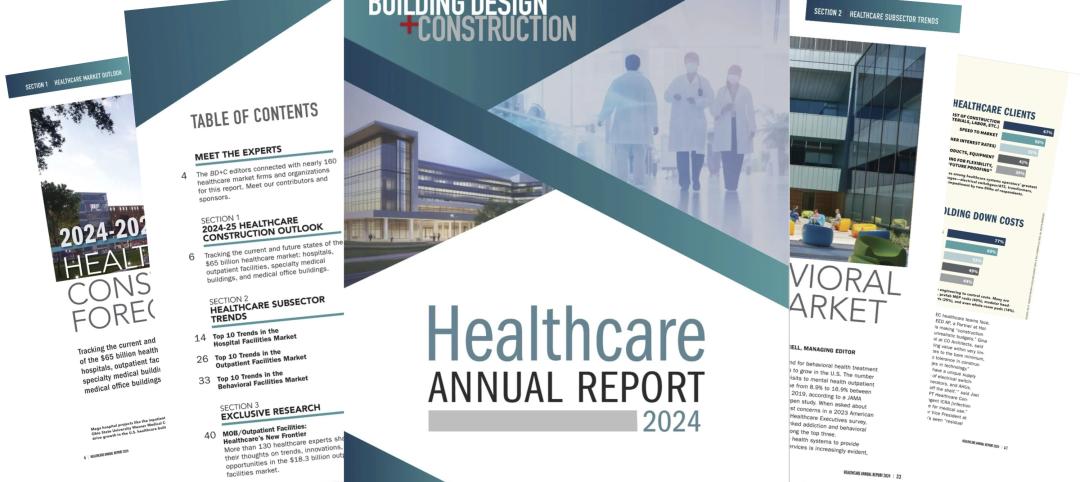Thornton Tomasetti, the industry’s third-largest engineering/architectural firm, has joined forces with Weidlinger Associates through a merger whose goals include cultivating a broadly based global practice that focuses on innovation, research, and development.
The combined company remains based in New York, and will operate under the name Thornton Tomasetti. However, the Weidlinger brand is sticking with three of the combined company’s 10 practices—applied sciences, protective design, and transportation—to leverage that brand’s already established recognition among customers.
While the terms of the merger were not disclosed, the Wall Street Journal reports that this transaction will be completed through an exchange of stock.
Jim Kent, a company spokesman, tells BD+C that all of Weidlinger’s senior-level management team are staying on, including Ray Daddazio, Weidlinger’s CEO, who will serve as Co-president of Thornton Tomasetti with Robert DeScenza until the end of 2016, at which point DeScenza plans to retire. Two of Weidlinger’s board members will join Thornton Thomasetti’s board of directors.
Thornton Tomasetti and Weidlinger already have experience developing products and services for the industry. These include PZFlex, an ultrasound product for the medical field that emerged from a seismic shock simulation product Weidlinger had developed for the federal government in the 1990s.
“Combining our firms [creates] significantly greater potential for growth and innovation than either firm could achieve alone,” says Thomas Scarangello, Thornton Tomasetti’s Chairman and CEO. “Our more-diverse merged expertise allows us to address a wider range of client needs, while offering enhanced breadth and depth of services and extended geographic reach.”
A key component of this merger will be the formation of an R&D holding company to develop innovative products and services for the company, as well as for other firms. Weidlinger also has strong connections as a government contractor in both the U.S. and the United Kingdom.
The combined company has 1,200 employees working in offices in 34 cities. (There had been relatively little competitive overlap between the two firms before this deal.) The Journal, quoting company officials, reports that the company is projected to generate about $240 million in revenue this year.
When asked about the timing of this merger, Daddazio tells BD+C that he and Scarangello, who have known each other for years, had dinner during the Construction Industry Roundtable conference in Florida last October. Scarangello told Daddazio about his company’s plans for the next five and 20 years, “and a lot of those goals resonated with me, especially when one of the first things he said was ‘we bet the farm on innovation.’ This is what Weidlinger has been about, with applied sciences and pushing the envelope.”
Weidlinger, he says, had previously spoken with several other firms about the possibility of mergers, but combining with Thornton Tomasetti had the potential for being a good fit, especially after a dinner meeting attended by the senior leaders of both companies last January, which Daddazio says went well enough to lead to more in-depth discussions.
Thornton Tomasetti and Weidlinger already have experience developing products and services for the industry. These include PZFlex, an ultrasound product for the medical field that, Daddazio explains, emerged from a seismic shock simulation product Weidlinger had developed for the federal government in the 1990s. “That product represents a couple million dollars in licensing revenue, and could be exponentially larger, now that we have a bigger platform to exploit.”
The same is true of tuned mass dampers that Thornton Tomasetti has developed with NASA, which are also being applied to reducing movements in skyscrapers.
Daddazio, who has been with Weidlinger since 1979, and was its President and CEO since January 1996, holds a doctorate from Columbia University’s School of Engineering and Applied Sciences. In his new role at Thornton Tomasetti, Daddazio expects his immediate focus will be to make sure the integration—which both companies’ boards and shareholders approved unanimously—goes as smoothly as possible.
“We’re really excited about this, and making it work,” says Daddazio.
Related Stories
MFPRO+ News | Jul 15, 2024
More permits for ADUs than single-family homes issued in San Diego
Popularity of granny flats growing in California
Codes and Standards | Jul 15, 2024
New York City code update changes definition of a major building
Changes affecting how construction projects in New York City are permitted will have significant impacts for contractors. On Dec. 11, the definition of a major building in the city’s code will change from 10 stories to seven, or 75 feet. The change will affect thousands more projects.
Adaptive Reuse | Jul 12, 2024
Detroit’s Michigan Central Station, centerpiece of innovation hub, opens
The recently opened Michigan Central Station in Detroit is the centerpiece of a 30-acre technology and cultural hub that will include development of urban transportation solutions. The six-year adaptive reuse project of the 640,000 sf historic station, created by the same architect as New York’s Grand Central Station, is the latest sign of a reinvigorating Detroit.
Healthcare Facilities | Jul 11, 2024
New download: BD+C's 2024 Healthcare Annual Report
Welcome to Building Design+Construction’s 2024 Healthcare Annual Report. This free 66-page special report is our first-ever “state of the state” update on the $65 billion healthcare construction sector.
Transit Facilities | Jul 10, 2024
Historic Fresno train depot to be renovated for California high speed rail station project
A long-shuttered rail station in Fresno, Calif., will be renovated to serve as the city’s high speed rail (HSR) station as part of the California High-Speed Rail Authority system, the nation’s first high speed rail project. California’s HSR system will eventually link more than 800 miles of rail, served by up to 24 stations.
Government Buildings | Jul 8, 2024
GSA adopts new accessibility guidelines for federal properties
The U.S. General Services Administration (GSA) adopted a new rule with new accessibility guidelines for federal buildings. The rule establishes that pedestrian facilities in the public right-of-way are readily accessible to and usable by people with disabilities.
Office Buildings | Jul 8, 2024
Office vacancy peak of 22% to 28% forecasted for 2026
The work from home trend will continue to put pressure on the office real estate market, with peak vacancy of between 22% and 28% in 2026, according to a forecast by Moody’s.
Virtual Reality | Jul 8, 2024
Can a VR-enabled AEC firm transform your project?
With the aid of virtual reality and three-dimensional visualization technologies, designers, consultants, and their clients can envision a place as though the project were in a later stage.
Green | Jul 8, 2024
Global green building alliance releases guide for $35 trillion investment to achieve net zero, meet global energy transition goals
The international alliance of UK-based Building Research Establishment (BRE), the Green Building Council of Australia (GBCA), the Singapore Green Building Council (SGBC), the U.S. Green Building Council (USGBC), and the Alliance HQE-GBC France developed the guide, Financing Transformation: A Guide to Green Building for Green Bonds and Green Loans, to strengthen global cooperation between the finance and real estate sectors.
Codes and Standards | Jul 8, 2024
New York State building code update would ban fossil fuels in new buildings
New York’s Building Code Council is set to include the All-Electric Buildings Act in its 2025 code update. The Act would ban natural gas and other fossil fuels in new buildings.

















